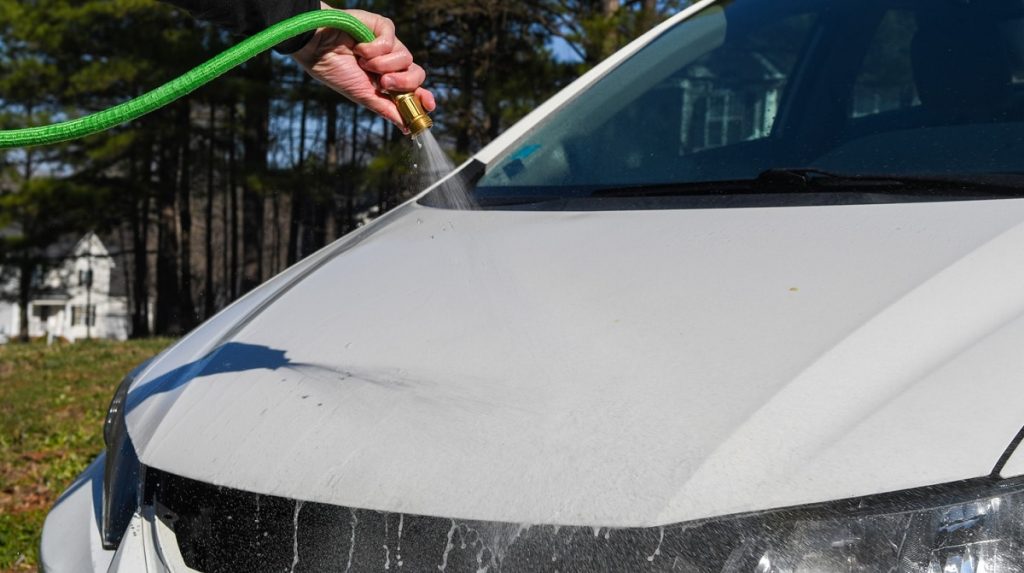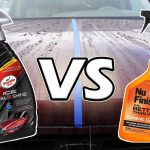When it comes to maintaining the pristine appearance of our beloved vehicles, the question of whether we can wash our cars with just water has become a point of intrigue. In the world of car enthusiasts, the allure of water-only washing has gained momentum, promising a simpler and more environmentally friendly approach. In this article, we’ll delve into the intricacies of water-only car cleaning, exploring its pros, cons, and addressing common myths to help you make an informed decision for your car care routine.
The Allure of Water-Only Washing
Understanding Water-Only Washing:
Water-only washing, also known as rinseless washing, has become a topic of interest among those seeking a greener alternative to traditional car cleaning methods. The fundamental concept revolves around utilizing water as the primary cleansing agent, without the need for traditional soaps or detergents. This raises the question: can water alone effectively remove dirt and grime from your car’s surface?
Pros and Cons:
To assess the viability of water-only washing, it’s essential to weigh the pros and cons. On the positive side, this method is heralded for its minimal environmental impact, as it reduces the use of chemical-laden cleaning agents. However, critics argue that water alone might not be potent enough to tackle stubborn stains or provide a comprehensive clean. Let’s explore these aspects in more detail.
Debunking Myths About Water-Only Car Wash
Myth 1: Water Isn’t Enough:
One prevailing myth surrounding water-only washing is the belief that water alone is insufficient for a thorough car cleaning. However, proponents of this method argue that water, when used strategically, can effectively lift and remove dirt particles without the need for soap. Understanding the science behind this process is crucial for dispelling common misconceptions.
Myth 2: Water-Only Damages Your Car:
Concerns about potential damage to a car’s finish often deter enthusiasts from adopting water-only washing. In reality, when done correctly, water-only washing poses minimal risk to your vehicle. Expert insights can shed light on the proper techniques and precautions to maintain your car’s aesthetic appeal while embracing this minimalist approach.
Tips for a Successful Water-Only Car Wash
Quality of Water Matters:
Not all water is created equal, and the quality of the water used can significantly impact the success of a water-only car wash. Exploring the differences between hard and soft water and their effects on cleaning efficiency is crucial. Learn how investing in a water softener or choosing high-quality water sources can enhance the outcomes of your water-only wash.
Techniques for Water-Only Cleaning:
Mastering the techniques of water-only cleaning is an art that involves more than a casual splash of water. From the importance of pre-soaking to the strategic use of microfiber cloths, understanding the nuances of this method can elevate your car cleaning routine. Practical tips and step-by-step guidance will empower you to achieve optimal results.
Addressing Concerns and Overcoming Challenges
Hard Water Challenges:
Hard water, laden with mineral deposits, can pose challenges during a water-only car wash. Explore the impact of hard water on your vehicle’s finish and discover effective ways to mitigate its effects. Tips for preventing mineral deposits and maintaining the longevity of your car’s exterior will be invaluable for those dealing with hard water challenges.
Environmental Impact:
While water-only washing is lauded for its environmental friendliness, it’s essential to delve deeper into its ecological footprint compared to traditional methods. Analyze the overall impact on water conservation and waste reduction, providing a holistic understanding of the method’s green credentials.
Beyond Water: Enhancing Your Car Wash Routine
Waterless Car Wash Products:
For those seeking alternatives that bridge the gap between water-only and traditional washing, the market offers a variety of waterless car wash products. Explore eco-friendly options that complement the water-only approach, providing convenience without compromising environmental values. Uncover the latest innovations in waterless cleaning solutions.
Combining Methods for Optimal Results:
Achieving the perfect balance between simplicity and effectiveness often involves combining different car-cleaning methods. Explore the synergy between water-only washing and other approaches, such as traditional soap-based cleaning or waterless products. Tailoring your routine to suit your car’s specific needs ensures a comprehensive and satisfying cleaning experience. (See Also: Is Chemical Guys Better Than Meguiar’s? A Detailed Comparison)
Expert Tips for Optimal Water-Only Car Cleaning
Embrace the simplicity of water-only car cleaning with these expert tips that elevate your vehicle care routine.
1. Quality Water is Key
When opting for a water-only wash, ensure the water you use is of high quality. Hard water can leave mineral deposits on your car’s surface, affecting its shine. Invest in a water softener or choose purified water for superior results.
2. Pre-Soak for Success
Before diving into the water-only wash, give your vehicle a thorough pre-soak. This helps loosen dirt and grime, making it easier to remove during the wash. Consider a gentle spray or even a misting bottle for an effective pre-soak.
3. Microfiber Magic
Make friends with microfiber cloths. Their gentle yet effective cleaning ability is unmatched. Use them for wiping and drying during your water-only car wash. The soft fibers minimize the risk of scratches, ensuring a pristine finish.
4. Strategic Rinsing Techniques
Master the art of strategic rinsing. Rather than haphazardly pouring water, focus on targeted areas. Start from the top and work your way down, letting gravity assist in carrying away dirt. This minimizes water wastage and maximizes cleaning efficiency.
5. Shade is Your Ally
Choose the right time to wash your car, preferably in a shaded area. Washing under direct sunlight can lead to water spots due to rapid evaporation. A shaded spot allows for a more leisurely and effective cleaning process.
6. Regular Maintenance Matters
While water-only washing is a minimalist approach, regular maintenance is still crucial. Schedule periodic traditional washes to address stubborn stains and provide your car with a more thorough cleaning. This ensures your vehicle maintains its shine over the long haul.
7. Mind the Details
Don’t overlook the small details. Pay attention to areas like door jambs, the fuel cap area, and under the side mirrors. These often-neglected spots can accumulate dirt and grime over time, impacting the overall cleanliness of your car.
8. Use Gravity for Drying
When drying your car after the water-only wash, let gravity do some of the work. Start drying from the top and allow the water to naturally flow downwards. This prevents water streaks and ensures a spot-free finish.
9. Invest in a Water Filtration System
For enthusiasts committed to water-only washing, consider investing in a water filtration system for your home. This ensures a constant supply of high-quality water, making every car wash a premium experience. (See Also: How to Clean Car Display Screen: Ultimate Guide for Spotless Screens)
10. Timing is Everything
Choose the right time to wash your car. Avoid washing during extreme temperatures, as water can evaporate quickly, leaving behind spots. Opt for milder weather conditions for a more leisurely and effective water-only car cleaning session.
Embrace these expert tips to make your water-only car cleaning experience not just a routine but a ritual that enhances the longevity and aesthetic appeal of your cherished vehicle.
Frequently Asked Questions (FAQs) About Water-Only Car Cleaning
Explore common queries regarding water-only car cleaning and discover expert answers to demystify this minimalist car care approach.
1. Can I Wash My Car With Just Water?
Absolutely! Water-only car cleaning, also known as rinseless washing, is a viable option for maintaining your vehicle’s cleanliness. Learn the proper techniques to make this method effective.
2. Does Water-Only Washing Damage My Car’s Finish?
When done correctly, water-only washing poses minimal risk to your car’s finish. Using high-quality water and following expert-recommended techniques can help maintain your vehicle’s aesthetic appeal.
3. Is Water Alone Enough to Remove Dirt and Grime?
Yes, water alone can effectively lift and remove dirt particles from your car’s surface. Explore the science behind this process and discover how strategic rinsing and pre-soaking play crucial roles.
4. How Does Water-Only Washing Impact the Environment?
Water-only car cleaning is applauded for its minimal environmental impact. Learn more about how this method contributes to water conservation and reduces chemical runoff compared to traditional washing.
5. What Type of Water is Best for Water-Only Washing?
The quality of water matters. Explore the differences between hard and soft water and understand how investing in a water softener or choosing purified water can enhance the outcomes of your water-only wash.
6. Can I Use Waterless Car Wash Products Instead?
Certainly! Waterless car wash products offer a convenient alternative that complements water-only washing. Explore eco-friendly options in the market that align with your preferences and values. (See Also: Meguiar’s 105 vs 110: Unveiling the Best Auto Polishing Compounds)
7. How Often Should I Perform a Water-Only Car Wash?
The frequency of water-only washing depends on various factors, including your location and driving conditions. While it’s a great routine, periodic traditional washes are recommended for a more thorough cleaning.
8. Does Water-Only Washing Save Water?
Yes, water-only washing contributes to water conservation by minimizing usage compared to traditional methods. Discover how strategic techniques and thoughtful practices further enhance water efficiency.
9. Can I Use Any Water Source for Water-Only Washing?
While you can technically use any water source, the quality matters. Explore the potential impact of hard water and consider investing in a water filtration system for optimal results.
10. Is Water-Only Washing Suitable for All Vehicles?
Water-only washing is generally suitable for most vehicles, but some conditions may require additional care. Explore tips for tailoring your water-only car cleaning routine to specific needs.
Delve into these FAQs to address any lingering questions about water-only car cleaning and gain valuable insights for a successful and satisfying car care routine.
Conclusion: The Verdict on Water-Only Car Cleaning
Making Informed Choices: As we conclude our exploration into water-only car cleaning, the answer to “Can I wash my car with just water?” becomes nuanced. Armed with a comprehensive understanding of the method’s intricacies, benefits, and challenges, you are now better equipped to make informed decisions tailored to your preferences and values.
Embrace the simplicity of water-only washing or explore the middle ground with waterless products – the choice is yours. Whichever path you choose, may your car cleaning endeavors be as fulfilling as the open road itself.



